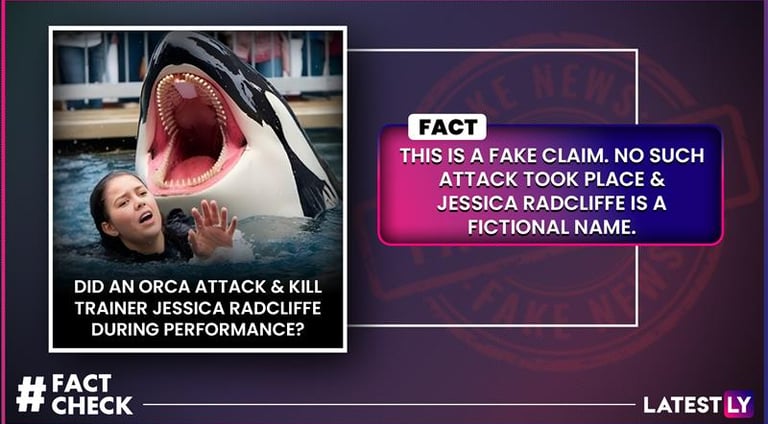From Viral Sensation to Digital Phantom: The Truth About the Jessica Radcliffe Orca Attack Hoax
8/13/2025
From Viral Sensation to Digital Phantom: The Truth About the Jessica Radcliffe Orca Attack Hoax
The internet loves a shocking story, and earlier this year, it found one in the so-called Jessica Radcliffe orca attack. The viral clip seemed ripped from a tragedy: a young marine trainer, smiling as she performed atop a killer whale, only to be pulled under in a sudden act of violence. The captions claimed she was a 23-year-old named Jessica Radcliffe, working at “Pacific Blue Marine Park,” and that she lost her life in front of a horrified audience. Within hours, millions had seen the footage, many leaving messages of grief and outrage.
Yet none of it ever happened. No Jessica Radcliffe exists in any employment records, obituaries, or media reports. No “Pacific Blue Marine Park” has ever operated anywhere in the world. The video itself, analyzed by forensic experts and media outlets including Snopes, NDTV, and The Economic Times, showed tell-tale signs of AI manipulation—unnatural movement, mismatched water splashes, and synthetic voiceovers. Investigators found the footage was either entirely AI-generated or created by splicing existing marine show recordings with fabricated faces and actions.
The hoax gained credibility by borrowing emotional weight from real tragedies, such as the deaths of Dawn Brancheau in 2010 and Alexis Martínez in 2009, both experienced trainers killed by orcas in captivity. By echoing these true events, the fake story slipped more easily into public belief. It also tapped into ongoing debates about marine animal welfare, giving people a moral reason to share it without question.
What made this fabrication particularly dangerous was not just the false grief it stirred, but the way it spread. Social media algorithms amplified it due to high engagement, while the visual nature of the claim—seeing the “attack” unfold—overrode viewers’ skepticism. Many only encountered the debunks days later, long after the clip had shaped their perceptions.
In the end, the “Jessica Radcliffe” saga stands as a warning. In an era when AI can fabricate realistic humans, events, and settings, a convincing fake is only a few clicks away. The next viral tragedy may not be any more real than this one, but without careful verification, it will still leave a very real mark on how people think, feel, and act online.


